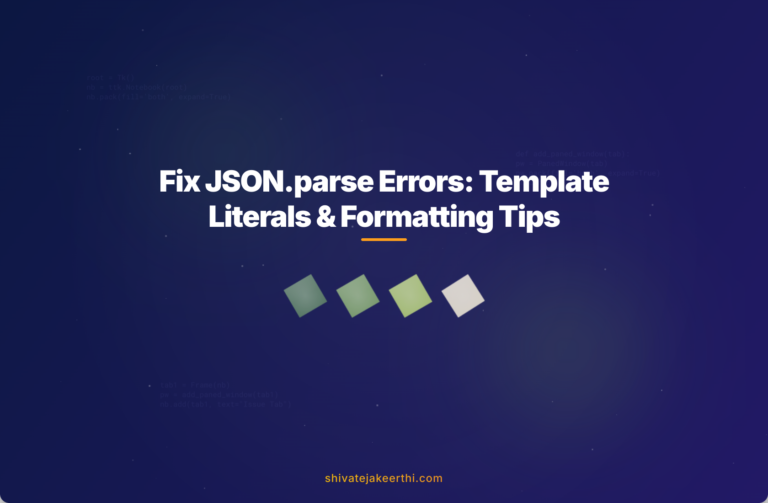When working with JavaScript, especially during data handling and manipulation, you might face a pesky issue called a JSON.parse error. It usually happens when template literals include quotation marks improperly and conflict with JSON formatting. If you’ve encountered a stubborn JSON parsing issue, especially with quotation marks, you’re definitely not alone. Today, we’ll unpack exactly why this happens and how you can fix it quickly.
Understanding JSON and Template Literals
First, let’s clarify what’s involved in this confusion: JSON and JavaScript template literals.
JSON, or JavaScript Object Notation, is a lightweight format used to store and transport data. It’s simple to read and write for humans and easy for machines to parse. JSON looks similar to JavaScript objects, using key-value pairs, but it strictly requires double quotes around property keys and string values.
Template literals, on the other hand, are a way in JavaScript to embed expressions within strings easily. By using the back-tick (`) characters instead of single or double quotes, you can create complex strings without messy concatenation. Template literals let you easily mix variables and expressions into strings neatly:
const name = "John";
const greeting = `Hi, my name is ${name}`;
console.log(greeting); // Hi, my name is John
This ease of combining strings and expressions makes template literals especially handy—until they produce JSON parsing errors.
Editor.js and JSON Data
If you’ve used Editor.js, you’ve likely realized that it’s a powerful open-source block editor that outputs content as structured data rather than HTML markup. Instead of HTML tags, Editor.js stores data blocks in a neat JSON format.
For example, an Editor.js block output might look like this:
{
"time": 1550476186479,
"blocks": [
{
"type": "header",
"data": {
"text": "Hello, world!",
"level": 2
}
}
],
"version": "2.8.1"
}
While this format is fantastic for structured data, it can create issues when embedding or parsing such JSON data within template literals in JavaScript.
Identifying the Problem with Quotation Marks
One notorious scenario you may stumble upon is embedding JSON data directly into a JavaScript template literal:
const jsonData = `{
"title": "Why "Hello World" is Famous",
"content": "Explaining the origins of "Hello World" in programming."
}`;
const parsedData = JSON.parse(jsonData);
console.log(parsedData);
The moment you run this, you’d likely receive an error message similar to:
Uncaught SyntaxError: Unexpected token H in JSON at position 18
This is because the double quotation marks around “Hello World” confuse the parser. JSON is very particular about quotation placement and escaping. Any mistakenly placed or missing escaped quotation marks immediately break the parser.
Troubleshooting the JSON.parse Error
At first, you might try replacing double quotes with single quotes inside strings. Maybe you’ve tried something like:
const jsonData = `{
'title': 'Why "Hello World" is Famous',
'content': 'Explaining the origins of "Hello World" in programming.'
}`;
This will again lead to an error. JSON strictly requires double quotes for keys and string values. Single quotes aren’t allowed according to the JSON specification.
So, how do you solve this problem?
Solutions to Fix the Issue
Here are two straightforward solutions you can use:
1. Escaping Characters in Template Literals
One of the simplest solutions is to escape quotation marks within your template literals properly.
If you rewrite your JSON by escaping each double quotation mark (`\”`), it’ll parse correctly:
const jsonData = `{
"title": "Why \\"Hello World\\" is Famous",
"content": "Explaining the origins of \\"Hello World\\" in programming."
}`;
const parsedData = JSON.parse(jsonData);
console.log(parsedData.title); // Outputs: Why "Hello World" is Famous
Although this method is common and quick, it can become tedious for larger blocks of JSON.
2. Using Alternative Parsing Methods
A cleaner method involves creating your data as a standard JavaScript object first, then converting it using JSON.stringify() if you need it in JSON string form later.
Consider:
const dataObject = {
title: 'Why "Hello World" is Famous',
content: 'Explaining the origins of "Hello World" in programming.'
};
const jsonData = JSON.stringify(dataObject);
const parsedData = JSON.parse(jsonData);
console.log(parsedData.title); // Outputs correctly: Why "Hello World" is Famous
This method ensures better readability, maintainability, and fewer punctuation errors.
Best Practices for Handling Quotation Marks in JSON
To avoid these headaches, here are some good practices:
- Always create your JSON as JavaScript objects first, then use JSON.stringify() when needed. It drastically reduces errors.
- Validate your JSON regularly using tools like JSONLint. This will quickly spot any potential errors.
- Make sure you properly escape any quotation marks within strings if you’re embedding raw JSON data into template literals.
- If your application deals extensively with structured content, especially coming from something like Editor.js, consider using data serialization and deserialization systematically.
- Keep JSON strings simple; if you have complex strings, handle them separately, or programmatically create your JSON structure to reduce manual mistakes.
Maintaining these practices helps keep your JSON data clean, error-free, and easy to handle in code.
Resolving JSON parsing errors around quotation marks may seem tricky initially, but once you understand the underlying reasons and solutions, it becomes second nature.
Are you facing persistent JavaScript issues? Check out our JavaScript articles to troubleshoot and expand your coding knowledge. Also, feel free to share your own tips for handling tricky JSON and template literal situations in the comments below!



0 Comments